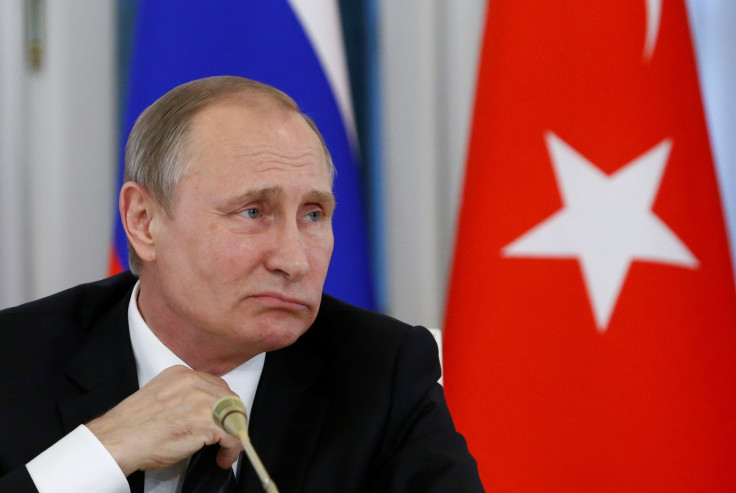Putin gay meme banned in Russia, those who like and share may face prison sentences

The government banned images that depict Russian President Vladimir Putin as a gay clown, claiming the photos represent “extremism." Those who like and share illegal online posts may face prison sentences.
The justice ministry added a photo of the Russian leader to its list of extremist images, totting up a list of more than 4,000 images classified as "extremist propaganda.” Radio Free Europe reported that the ministry based its ruling on the criminal case of Aleksandr Tsvetkov, who allegedly shared hate speech by posting gay Putin memes on Russian social networking site called Vkontakte. The photo was barred because it suggested that the Russian president suffered from an "alleged nonstandard sexual orientation."
Meme featuring Putin supposedly started to flood the Internet in 2013 after Russia began to crack down on the LGBTQ community and barred sharing "nontraditional sexual relations propaganda" with kids. There are several variations of the meme, in which Putin is depicted in brightly coloured cosmetics, and it is unclear which one specifically is proclaimed illegal.
@Navsteva @rahulvarshney @KevinRothrock A meme doesn't make him corrupt any more than this makes Putin gay pic.twitter.com/xiGbRZNaRB
— NoBigGovDuh (@NoBigGovDuh) December 5, 2015
Meanwhile, Russia’s presidential press secretary Dmitry Peskov said Putin, as a president, is resilient to vulgarities of such types no matter how personal they may be. “As a person, he might be stung, but as president he is quite resilient to these vulgarities and has learned to brush them off long ago,” Peskov said, per Russia’s state-run Tass news agency. He assured that he will take a look of the photo in question.
The implementation of “internet extremism” laws began in Russia in 2013 shortly after Putin resumed his seat following the 2012 election according to the Moscow Times. Misrepresentation of Russian public figures is currently illegal in the country, and these figures have the right to file court complaints if they feel upset about memes.
The paper also reported that Putin approved a law imposing prison sentences for people who give so much as thumbs-up to an illegal online post. Russia's internet censor permits public figures to file court complaints when they see an online post that misrepresents their “personality.”
The Washington Post noted that Russian authorities began shutting down websites that criticise its leader and restricted almost all anonymous blogs in 2015. Last year, a single mother was reportedly sentenced to do community service after he reposted a cartoon of Putin looking at a map while holding a knife. A former naval captain from Rostov obtained a year of probation and two-year suspended sentence after he shared an antiwar report about Ukraine.
Video Source: YouTube/VBLAST






